Category: Long reads
A social history of named student houses in Dunedin, New Zealand
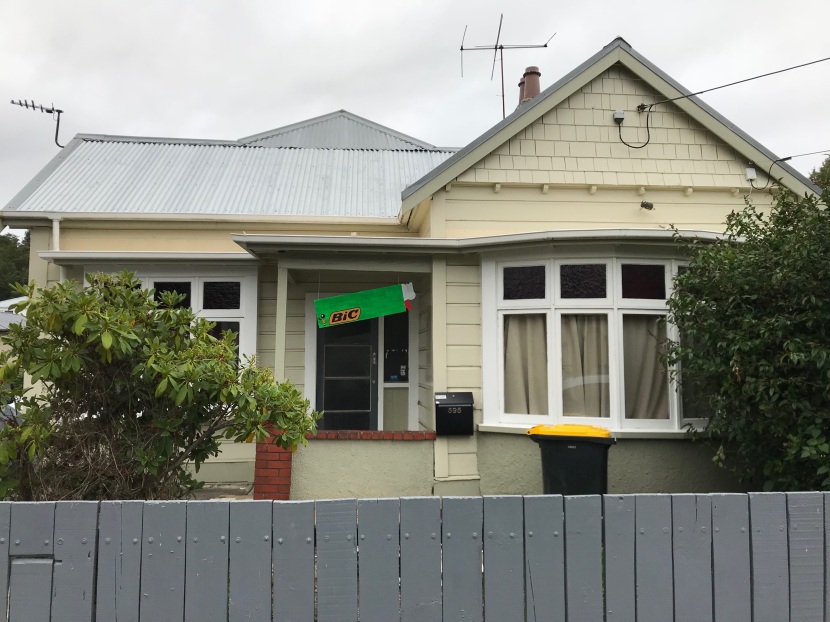
Recently I had the opportunity to submit a post to the University Histories blog. This research group, based at the University of Manchester in the UK, conducts research on the history of universities. You can read it here.
https://universityhistories.com/category/students-and-student-life/
Missing details
Can you fill in the blanks?
While I’ve collected details of flat names and address for over 500 flats which you can see on the flats map, I do have a list of named flats where details are missing. I’ve heard about these flats from a variety of sources: memoirs, emails, facebooks posts…
In order to map a flat I need an accurate address (even if that street doesn’t exist anymore, like with Hobbit) and to see patterns of naming over time I need to know the decade that flat was present in.
How you can help
If you have any details about any of the following flats, please do email me at flatnames[at]gmail.com mentioning the flat by name and any details you remember.
Xanadu on Eden Street
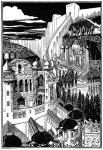
Illustration of Xanadu by Pattern Wilson (1898)
Back in the mid 1970s there was a flat called Xanadu at 3 Eden Street. The name was painted in an Asiatic typeface in black on the white front door. The flat adjoined a corner store run by the Verkerk family.
The origin of the flat’s name may be lost in the mists of time but is has been suggested it had its origins in the poem Khublah Khan written by Samuel Coleridge, in an opiate haze c.1797 [1].
Whether or not this is the case, the flat was certainly around too early to be named for the 1980 roller-opera starring Olivia Newton John, and the hit song of the same name written by Jeff Lynne.
Eden Street no longer exists but was only a couple of blocks from the main University campus to the west. The street was built over in the redevelopment of the intersection of Union and Eden Street when Otago Polytechnic was expanding. The flat would have been where H Block is currently situated.
The original location of Eden Street can still be seen in a map (below) from the DCC Rating Information Database.
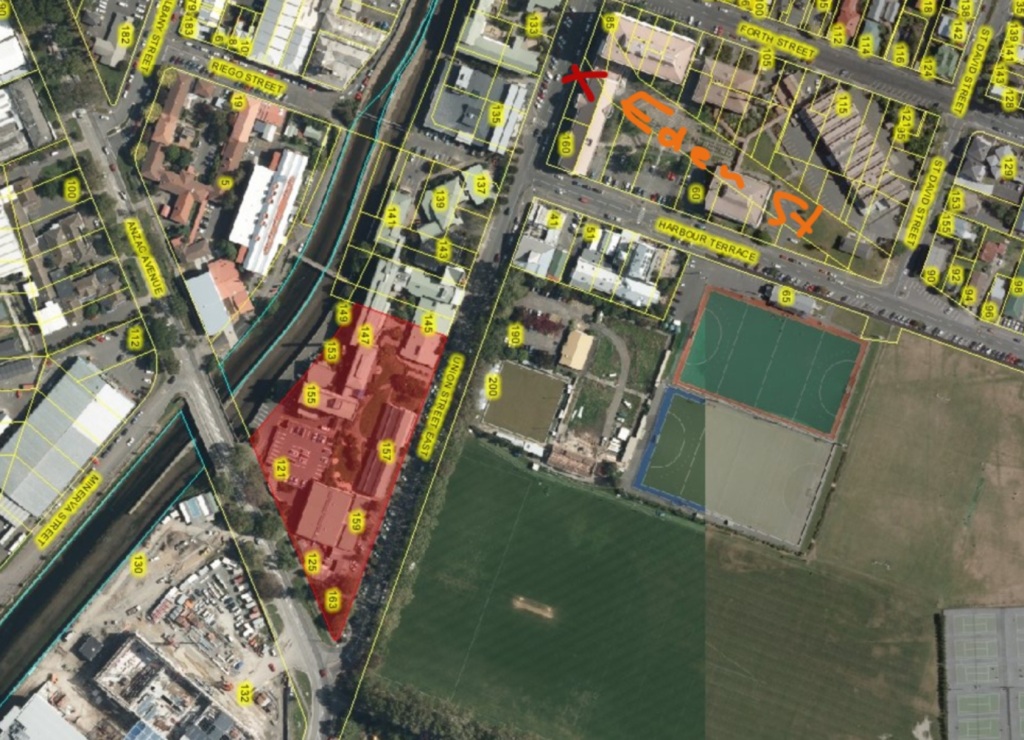
View of Eden Street. Map from DCC Rates Database, modified by Judy Fisher.
The photographs below show the intersection of Union and Eden Streets with Verkerk’s store on the left and Xanadu adjoined, and the photograph of flatmates outside their named flat are taken in 1976. Judy Fisher (third from the left), a resident of Xanadu from 1976-1977 remembers:
“We walked out of that door turned hard left and back into the shop, where they made the most amazing bacon burgers and chips … Mrs Verkerk always remembered us all 20+ years later, when she was in the new store ( which her son owns now).”[2]
The family shop, known as the Campus Wonderful Store is still 138 Union St where it’s been feeding local students with pies, chips and grocery items for decades.[3]
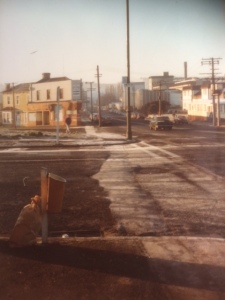
Photo taken from the intersection Forth and Union Sts looking towards the site of the flat Xanadu (yellow building) and the Verkerk’s store on the corner of Eden and Union Sts. Image source: Verkerk Family (via Judy Fisher)
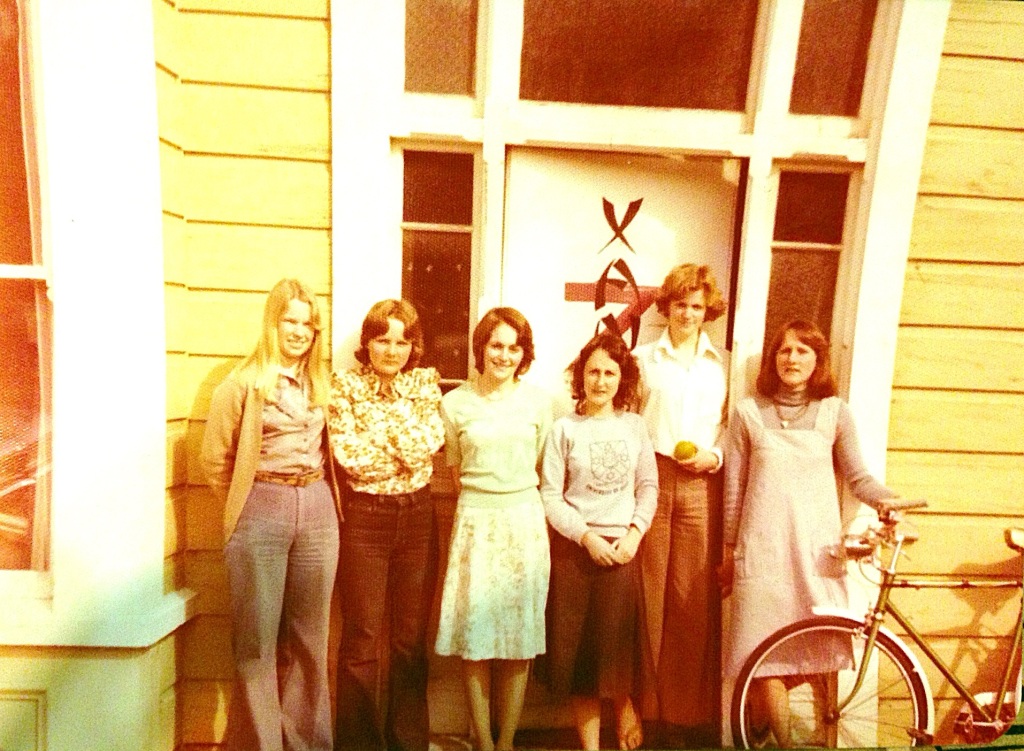
Flatmates outside Xanadu, 3 Eden Street (1976). Image Source: Judy Fisher
References
[1] Holmes, Richard. Coleridge: Early Visions, 1772–1804. New York: Pantheon, 1989.
[2] Fisher, J. Email 23 May 2016
[3] The Verkerk’s intend to build a new store on site with apartments above. See Corner building opponent’s concerns dismissed, ODT 10 November 2016.
Shambles (1950s and 1960s)
Where Scribes Bookshop is now, on the corner of Great King and St David Streets in Dunedin, there was once a notorious flat, called the Shambles. It was well known for it’s parties and as a location to go to continue drinking once the pubs had closed.
It’s not entirely clear from where the name of the flat originated: it may have been the shambolic nature of the place itself, or it may, as has been suggested by a former resident, been named for a place in Manchester of the same name.
Shambles is an old name and derives from Viking word Shamel apparently meaning ‘bench’, ‘booth’ or ‘shelf’ and the name is found in many places in the UK where there are market places.
The most famous example such a place is the Shambles in York which is allegedly mentioned in the Doomsday Book, one of the few streets that is. This would make it over 900 years old.

This is a quintessential medieval street with upper storeys of buildings stretching out across the street precariously towards each other. The street was once a flesh market (hence also being known as Flesshamel) – that is, a street of butchers. Livestock were slaughtered in the streets and it’s been suggested that it is this resulting mess that provides the word shambles with its contemporary definition. In fact the OED gives three definitions: 1) a mess or muddle, 2) a butcher’s slaughterhouse, 3) a scene of carnage.
Reports about the Shambles in Dunedin, of parties and exploding pans of golden dough boys from the 1950s and 60s, suggest the OEDs third definition may be most approprite for explaining the name of our Great King Street residence.